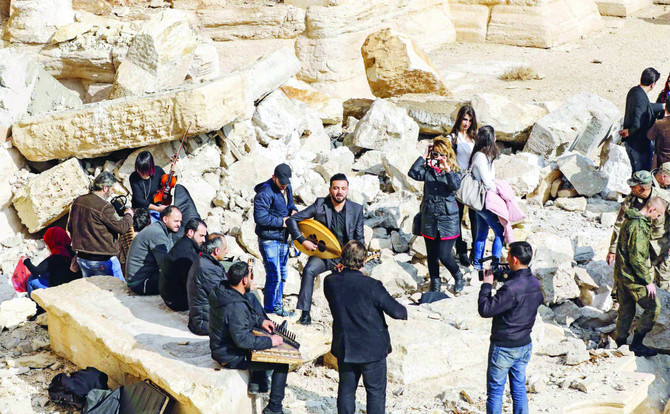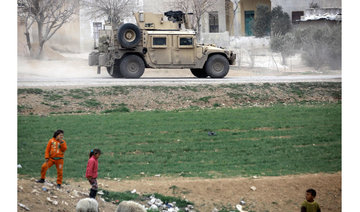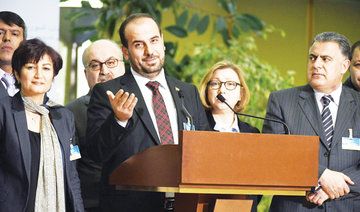BEIRUT: At least 11 civilians were killed and dozens more wounded on Saturday in airstrikes on a central Syrian village that a monitor said were likely carried out by Russia.
“The raids targeted a livestock market in the village of Oqayrabat, held by the Daesh group in Hama province,” said Rami Abdel Rahman, head of the Syrian Observatory for Human Rights.
“They are probably Russian airstrikes,” he said, adding that 45 people were also wounded,
Oqayrabat lies northwest of Palmyra, the ancient desert city that was recaptured by Russian-backed regime forces from Daesh on Wednesday.
The road between the two had been often used by radical militants to travel between the provinces of Hama and Homs, where Palmyra lies.
Abdel Rahman said the raids on the village were part of “new military operations by the Syrian regime and its Russian ally targeting terrorist positions in Hama province.”
Syrian and Russian warplanes on Saturday were heavily bombing Daesh extremists north and east of Palmyra, which has changed hands several times in Syria’s nearly six-year war.
The Organization for the Prohibition of Chemical Weapons (OPCW) also raised fears at the time that chemical weapons may have been used in airstrikes on Oqayrabat.
The Observatory, which relies on a network of sources inside Syria for its information, says it determines whose planes carry out raids according to type, location, flight patterns and munitions used.
Tens of thousands of Syrian civilians have fled ferocious fighting between Russian-backed regime forces and Daesh militants over the past week in the country’s ravaged north.
Supported by Russian air power and artillery, regime forces have seized around 90 villages from the terrorists since mid-January.
Their aim is Daesh-held Khafsah, the main station pumping water into Aleppo.
Residents of Syria’s second city have been without water for 47 days after the terrorists cut the supply.
The fighting over the past week has sparked an exodus of “more than 30,000 civilians, most of them women and children,” Abdel Rahman said.
Most of the displaced went to areas around Manbij, under the control of the Syrian Democratic Forces (SDF), an alliance of Kurdish and Arab fighters backed by the US that is also fighting Daesh, the monitor said.
An AFP correspondent in Manbij saw dozens of displaced families speeding toward the relative safety of the town on motorcycles and in small buses and cars.
Many of them looked exhausted as they lined up at a checkpoint manned by the Manbij Military Council, the SDF unit that controls the town, to be searched and get permission to enter.
Ibrahim Al-Quftan, co-chair of Manbij’s civil administration, told AFP that as many as 40,000 displaced people had arrived in the town in recent days.
“The numbers of displaced people here are still rising because of the clashes between the Syrian regime and Daesh,” Al-Quftan said.
“These people are suffering very difficult circumstances.”
Manbij is already hosting “tens of thousands of displaced people that fled previous clashes in the area and are living in difficult circumstances,” according to Abdel Rahman.
In another development, Syria’s chief negotiator in Geneva said that the “only thing” achieved at 10-day talks was an agreed agenda and that the regime wanted a unified opposition delegation as its negotiating partner.
In his first remarks since talks ended on Friday, Syria’s ambassador to the UN Bashar Al-Jaafari said the agenda agreed through UN mediator Staffan de Mistura gave equal weight to four subjects, including the regime’s own priority of fighting terrorism.
“Nothing has been adopted so far, there is nothing final at all except for the agreement on an agenda. This is the only final thing that we achieved in this round,” Al-Jaafari told reporters in Geneva.
Damascus sought a unified Syrian opposition, “not a Saudi partner nor a Qatari, Turkish or French partner.” “What is asked is to have a partner,” he said.
The main Syrian opposition at the talks is the High Negotiations Committee (HNC) but there are also two smaller dissident groups which have no military muscle but enjoy Moscow’s blessing as opposition voices.
Jaafari said a “first condition” was to have a Syrian national opposition that did not seek help from other parties.
The second condition was to have a unified opposition that agreed on a common agenda, he said.
Jaafari said the government was studying whether to return for the next round of Geneva talks later in March. De Mistura says he plans to continue separate talks with the two sides on substantive issues after reporting to the UN Security Council next week.
“The train is ready, is in the station, is warming up its engine, everything is ready and it just needs an accelerator,” de Mistura told reporters on Friday night. “And the accelerator is in the hands of those who were attending this round.”
Strikes kill 11 civilians in Syria as tens of thousands flee clashes with Daesh
Strikes kill 11 civilians in Syria as tens of thousands flee clashes with Daesh

Israel army says intercepted projectile launched from Yemen

- Israeli military also intercepted a drone launched from Yemen on Monday
JERUSALEM: The Israeli military said it intercepted a projectile fired from Yemen on Monday before it crossed into Israeli territory, in the latest in a series of ongoing attacks.
“One projectile launched from Yemen was intercepted by the IAF (Israeli air force) prior to crossing into Israeli territory,” the military said in a statement.
Earlier on Monday the military said it had also intercepted a drone in southern Israel that was launched from Yemen.
Since the war in the Gaza Strip broke out in October 2023, the Iran-backed Houthi militants who control swathes of Yemen have repeatedly fired missiles and drones at Israel in what they say is a show of solidarity with the Palestinians.
In retaliation, Israel has struck Houthi targets several times inside Yemen, including in the Houthi-controlled capital Sanaa.
Iraqi PM outlines vision for UK relations ahead of official visit

- Mohammed Al-Sudani will meet with King Charles, PM Keir Starmer
- Visit ‘reflects my government’s commitment to strengthening the strategic partnership’
LONDON: Iraq’s prime minister has called for bolstering economic, trade and security ties with the UK ahead of an official visit to the country.
Mohammed Al-Sudani will arrive in London on Jan. 13 and will meet with King Charles, Prime Minister Keir Starmer and senior British officials.
Writing in the Telegraph on Sunday, Al-Sudani said the visit “reflects my government’s commitment to strengthening the strategic partnership between Iraq and the UK.”
He warned that it comes amid “unprecedented and escalating events in the Middle East” that threaten the region and the wider world.
Al-Sudani wrote that regional and international solidarity will ensure that the “free will and aspirations of the Syrian people are respected.”
He praised the UK’s support for Iraq’s fight against Daesh, and said the bilateral relationship had significantly transformed in recent decades.
“Today, as our country achieves greater levels of security and stability, the time has come to transition to a new phase of sustainable economic partnership,” he added.
Al-Sudani will aim to attract British investment in Iraqi energy infrastructure during his visit. It is part of a larger plan to establish Iraq as an international trade hub.
“We will continue to encourage more British investments in oil and gas, as well as in renewable energy projects, recognizing the importance of diversifying energy sources and addressing environmental challenges in the long term,” he wrote.
Al-Sudani highlighted banking reform as another area of potential cooperation with the UK, whose financial institutions and expertise can “improve government services and enhance administrative efficiency.”
He added: “We are determined to channel investments into developing education and training to equip young Iraqis with the skills required to meet the demands of the next phase of development.”
Counterterrorism efforts involving the UK could protect both domestic and regional stability, Al-Sudani said, adding that Iraq could benefit from British military industries.
“My upcoming meetings in London carry a clear message: Iraq is committed to building partnerships based on shared interests and forward-looking vision,” he said.
“We seek a global partner with political and economic weight, and the UK is well-positioned to play this vital role as we embark on a new chapter of growth and reconstruction.”
The Iraqi delegation to the UK includes ministers, MPs, Basra’s governor and representatives from the private sector.
UAE sends 35 trucks in 3 convoys to deliver aid to Gaza

- The latest Emirati delivery of essential supplies includes medical equipment such as dialysis machines and ultrasound devices, plus food and shelter materials
- The UAE has dispatched 153 humanitarian convoys to Gaza since November 2023, with 2,391 trucks delivering more than 29,274 tonnes of aid
LONDON: Three convoys of trucks carrying aid from the UAE this week crossed into the Gaza Strip through the Rafah crossing on the border with Egypt.
A total of 35 trucks carried more than 248.9 tonnes of humanitarian supplies, including more than 100 tonnes of medical supplies, the Emirates News Agency reported.
The deliveries are part of an ongoing Emirati humanitarian campaign to help the Palestinian people during the war between Israel and Hamas. Since the launch of “Operation Chivalrous Knight 3” in November 2023, the UAE has sent 153 convoys into the Gaza Strip, with a total of 2,391 trucks delivering more than 29,274 tonnes of aid.
The essential supplies delivered by the latest convoys included medical equipment such as dialysis machines, ultrasound devices, resuscitation sets, wheelchairs and respiratory masks, the news agency added. Other items included food, tents and sacks of flour.
Fadel Al-Shamsi, a spokesperson for the Emirati aid operation, said care was taken to maintain the highest standards of safety and quality during the storage and transportation of the medical supplies to Gaza.
Palestinian president meets British FM in Ramallah

- Mahmoud Abbas briefed David Lammy on Israeli aggression in the occupied West Bank and East Jerusalem
LONDON: Palestinian President Mahmoud Abbas received British Foreign Secretary David Lammy on Monday at the Palestinian Authority’s headquarters in Ramallah.
Abbas discussed with Lammy the need to implement UN Security Council Resolution 2735, which calls for a ceasefire in the Gaza Strip and a complete withdrawal of Israeli forces from the coastal enclave.
He highlighted the UK’s backing for the efforts to gain international recognition of the State of Palestine and its full membership in the UN, as part of the two-state solution to the Israeli-Palestinian conflict.
He briefed Lammy on the latest Israeli aggressions in the occupied West Bank and East Jerusalem, the WAFA news agency reported.
Lebanon president, US general discuss Hezbollah-Israel truce

- Kurilla and Aoun spoke about “the situation in the south and the stages of implementing the Israeli withdrawal from the south,” the presidency said
BEIRUT: Lebanon’s president and a top US general discussed on Monday the implementation of a fragile truce between Lebanese militant group Hezbollah and Israel in the south of the country, the presidency said.
President Joseph Aoun and the head of US Central Command, General Michael Kurilla, met as a January 26 deadline to fully implement the terms of the ceasefire approached.
Kurilla and Aoun spoke about “the situation in the south and the stages of implementing the Israeli withdrawal from the south,” the presidency said.
Under the November 27 ceasefire accord, the Lebanese army has 60 days to deploy alongside UN peacekeepers in the south of Lebanon as the Israeli army withdraws.
At the same time, Hezbollah is required to pull its forces north of the Litani River, some 30 kilometers (20 miles) from the border, and dismantle any remaining military infrastructure it has in the country’s south.
A committee composed of Israeli, Lebanese, French and US delegates, alongside a representative from the UN peacekeeping force, has been tasked with monitoring the implementation of the deal.
Former army chief Aoun was elected head of state on Thursday by lawmakers — a vote that followed the weakening of Hamas in the war — ending a more than two-year deadlock during which the position was vacant.
Aoun and Kurilla also discussed “ways to activate cooperation between the Lebanese and American armies,” the presidency said.
The United States has been a key financial backer of the Lebanese armed forces, especially since the country’s economy collapsed in 2019.
Meanwhile, Israel carried out air strikes in east and south Lebanon on Sunday, with the Israeli military saying it struck Hezbollah targets including smuggling routes along the border with Syria.
Israeli strikes in south Lebanon on Friday killed five people, according to the Lebanese health ministry, with the Israeli military saying it targeted a Hezbollah weapons truck.























